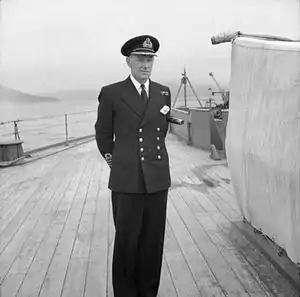John Leach (Royal Navy officer)
John Catterall "Jack" Leach, DSO, MVO (1 September 1894 – 10 December 1941) was a British naval officer. He was the only captain of the battleship HMS Prince of Wales during her short period in service.
John Catterall Leach | |
|---|---|
 Captain John Leach on the deck of HMS Prince of Wales in 1941 | |
| Born | 1 September 1894 |
| Died | 10 December 1941 (aged 47) HMS Prince of Wales, South China Sea, off Kuantan, Malaya |
| Allegiance | |
| Service/ | |
| Years of service | 1907–1941 |
| Rank | Captain |
| Commands held | HMS Prince of Wales (1941) HMS Cumberland (1936–38) |
| Battles/wars | First World War Second World War |
| Awards | Distinguished Service Order Member of the Royal Victorian Order |
| Relations | Sir Henry Leach (son) |
The Bismarck
Very soon after the Prince of Wales entered active service in 1941, the ship fought under Leach's command in the Battle of the Denmark Strait, and suffered damage fighting the German battleship Bismarck. However, damage inflicted by the Prince of Wales caused the Bismarck to lose fuel, forcing the latter to attempt to return to a base in occupied France.[1]
Despite a proposal to court-martial Leach for breaking off the action with the Bismarck after the Hood had sunk,[2][3][Note 1] he was awarded the Distinguished Service Order for his part.[4] In the 1960 film Sink the Bismarck! Leach was played by actor Esmond Knight, who had been on the Prince of Wales' bridge with Leach during the Battle of the Denmark Strait and was partially blinded when the ship was hit by Bismarck's gunfire.[5]
Force Z
In late 1941, Prince of Wales formed part of Force Z sent to Singapore. Off the coast of Malaya, she was sunk by the Japanese. Captain Leach died when the ship was lost.[6]
His son was Henry Leach (1923–2011), who was First Sea Lord of the Royal Navy during the Falklands War.[7]
Notes
- Kennedy expounds on the court martial claim via the epilogue in Pursuit - The Sinking of the Bismarck. According to Kennedy the claim for a proposal to court martial Leach came from post war letters written by Admiral Tovey, after he retired, and not from Admiralty sources. Kennedy states in his epilogue that "...later in life Tovey's memory let him down..." and that plus the fact that Leach was retained in his command and given a commendation must cast considerable doubt on the court martial proposal.
References
- Garzke & Dulin 1985, p.230
- Kennedy, Ludovic (1974). Pursuit – The Sinking of the Bismarck. Book Club Associates. p. 212.
- Roskill, Stephen (1978). Churchill and the Admirals. William Morrow & Company. p. 125 & 313.
- Houtermann, Hans. "Royal Navy (RN) Officers – 1939–1945". Retrieved 14 July 2010.
- "Esmond Knight". IMDb. Retrieved 4 December 2020.
- Chesneau, p. 13
- "Admiral of the Fleet Sir Henry Leach". The Telegraph. 26 April 2011. Retrieved 27 August 2012.
Bibliography
- Chesneau, Roger (2004). King George V Battleships. ShipCraft. 2. London: Chatham Publishing. ISBN 1-86176-211-9.
- Hein, David. “Vulnerable: HMS Prince of Wales in 1941.” Journal of Military History 77, no. 3 (July 2013): 955–989. Abstract online: http://www.smh-hq.org/jmh/jmhvols/773.html
- Garzke, William H.; Dulin, Robert O. (1985). Battleships: Axis and Neutral Battleships in World War II. Annapolis: Naval Institute Press. ISBN 978-0-87021-101-0.
- Willis, Matthew B. 'In the Highest Traditions of the Royal Navy: The Life of Captain John Leach, MVO, DSO'. The History Press, 2011.